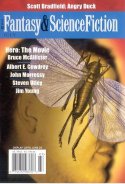
| Editor: | Gordon van Gelder |
| Issue: | Volume 109, No. 1 |
| ISSN: | 1095-8258 |
| Pages: | 162 |
The supporting material was distinctly uninspiring this month. Neither book review column was particularly interesting, and the movie reviews were okay but not particularly great. The stories, though, were a cut above the average for F&SF, and remarkably had no real failures.
"The Tournament at Surreptitia" by John Morressy: An amusing if not particularly memorable bit of sword and sorcery, mostly sorcery, that pokes fun at the cliches of the genre. I was amused by the idealistic progressive king, but the jokes were mostly too obvious and too easy to be really funny. (6)
"The Pitiless Stars" by Jim Young: A fun premise of exploration by uploaded personalities, but not a tremendous amount of story. I liked the puzzle and discovery part of the story, and it didn't drag out. The ending twist is amusing, although it doesn't make a lot of scientific sense. (6)
"Angry Duck" by Scott Bradfield: Behind the Music and similar shows are great fun to parody, and this is one of the best that I've read. It's told as a set of interviews for a typical sort of retrospective biography about an angry poet. Who happens to be a duck. It comes complete with bits of culture clash between duck and human culture and a few nice, subtle comments on the sorts of culture conflicts that arise in the life stories of people who came to the entertainment world from very different cultures. Very well done. (8)
"Twilight States" by Albert E. Cowdrey: I'm not much of a fan of Cowdrey's stories, but this one is a little better than "The Amulet". There's a good setup with a bookstore owner, his mysterious family background, and a psychiatrist. Unfortunately, it then shifts into a fantasy twist that never makes much sense, and the ending didn't do anything for me. (5)
"Think So?" by Robert Reed: A satisfying parody of the stupidities of copyright and patent law, set in a world where everyone gets royalties for everything they did before other people. Ubiquitous monitoring ensures that the system is fair, but a wrinkle is thrown into this system when someone, for medical reasons, has their thoughts recorded. Full of cute little tweaks at the stupidity of absolutist intellectual property. (7)
"Promised Land" by Steven Utley: The beginning of this story almost lost me, and throughout it the science fiction aspects just didn't do much. It turns out not to matter much, though. The real point here is a moving story about a dying scientist and his interactions with his work, his collegues, and his wife. I liked this far more than I thought I would at first, but the science fiction content is superfluous and could have been significantly shortened or dispensed with entirely. (7)
"Old As Books" by Mike Shultz: There isn't much ground-breaking in this quiet story about a librarian of magic reaching the end of his career, but I fell in love with the setting. The library stores volumes that whisper and speak to the librarians, who are aware of everything in their sections and who are responsible for ensuring that books are not misshelved, placed upside down, or otherwise taken out of their appointed places in ways that could hurt the magic. The characters were great; I would love to read more stories about the girl coming for her tests as a librarian that the main character encounters. The best story of the issue. (8)
"Hero, the Movie" by Bruce McAllister: When you're the hero of a B movie, what happens after you save the world from the giant insects? There's the post-traumatic stress, the failure to find any challenge that makes you feel the same, the deterioration of your marriage to the professor's daughter, the struggle to find something that matters to you afterwards... in short, not much like happily ever after. Taking a realistic look at the aftermath of completely unrealistic events isn't a new idea, but it still has some life left into it, and the cinematic movie image telling of the story helps this novelette. The ending, however, comes rather out of left field, and felt like it undermined the rest of the story in odd ways. (6)
Reviewed: 2005-10-09